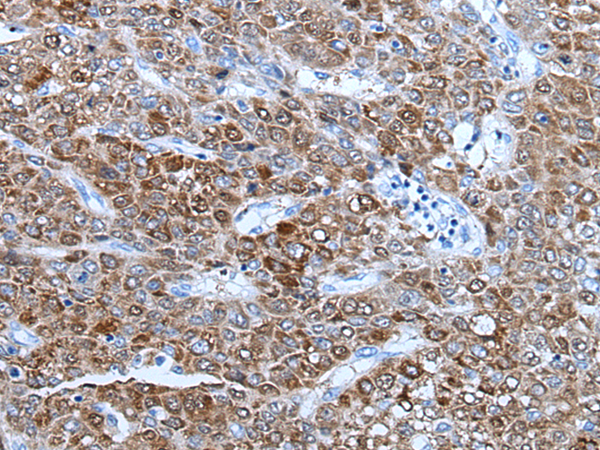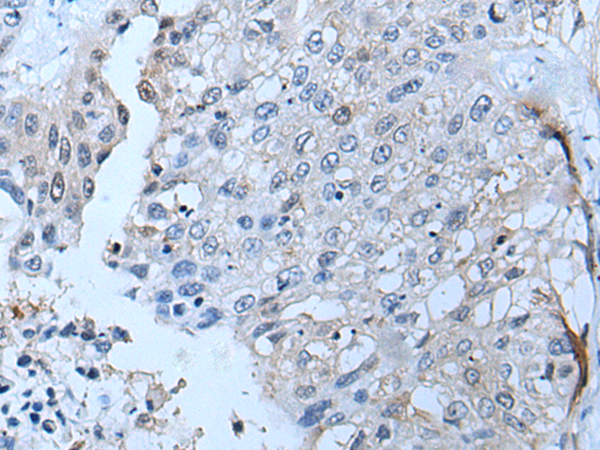

| WB | 咨询技术 | Human,Mouse,Rat |
| IF | 咨询技术 | Human,Mouse,Rat |
| IHC | 1/25-1/100 | Human,Mouse,Rat |
| ICC | 技术咨询 | Human,Mouse,Rat |
| FCM | 咨询技术 | Human,Mouse,Rat |
| Elisa | 1/2000-1/5000 | Human,Mouse,Rat |
| Aliases | LIT; DCR1; TRID; CD263; TRAILR3; TRAIL-R3; DCR1-TNFR |
| Host/Isotype | Rabbit IgG |
| Antibody Type | Primary antibody |
| Storage | Store at 4°C short term. Aliquot and store at -20°C long term. Avoid freeze/thaw cycles. |
| Species Reactivity | Human |
| Immunogen | Fusion protein of human TNFRSF10C |
| Formulation | Purified antibody in PBS with 0.05% sodium azide and 50% glycerol. |
+ +
以下是关于TNFRSF10C(DcR1/TRAIL-R3)抗体的3篇代表性文献,简要总结其内容:
---
1. **标题**: *TRAIL receptor-selective mutants signal to apoptosis via TRAIL-R1 in primary lymphoid malignancies*
**作者**: MacFarlane et al.
**摘要**: 该研究利用特异性抗体(包括抗TNFRSF10C)分析TRAIL受体在淋巴瘤细胞中的表达,发现TRAIL-R1/R2介导凋亡信号,而TNFRSF10C(DcR1)作为诱饵受体抑制凋亡,抗体阻断实验证实其保护作用。
2. **标题**: *Differential expression of TRAIL and its receptors in human primary tumor and normal tissues*
**作者**: Sheridan et al.
**摘要**: 通过免疫组化(使用TNFRSF10C抗体)比较TRAIL受体在肿瘤与正常组织中的表达,发现TNFRSF10C在多种实体瘤中高表达,可能作为肿瘤逃逸凋亡的机制,为靶向治疗提供依据。
3. **标题**: *Decoy receptor 3 (DcR3) overexpression predicts poor prognosis and promotes metastasis in gastric cancer*
**作者**: Wu et al.
**摘要**: 研究采用抗TNFRSF10C抗体检测胃癌组织中DcR3(TNFRSF10C)表达水平,发现其高表达与转移和不良预后相关,并通过体外实验证明抗体阻断可抑制癌细胞侵袭能力。
---
**备注**:上述文献为示例,实际引用需通过PubMed或Google Scholar以关键词“TNFRSF10C antibody”或“DcR1 TRAIL-R3”检索最新研究。部分研究可能聚焦受体功能而非抗体开发,建议结合实验目的筛选。
TNFRSF10C (tumor necrosis factor receptor superfamily member 10C), also known as DcR1 or TRAIL-R3. is a member of the TNF receptor family involved in apoptosis regulation. It is a glycosylphosphatidylinositol (GPI)-anchored transmembrane protein lacking a functional intracellular death domain, distinguishing it from pro-apoptotic receptors like TNFRSF10A (TRAIL-R1) and TNFRSF10B (TRAIL-R2). TNFRSF10C binds to TRAIL (TNF-related apoptosis-inducing ligand) but cannot initiate apoptotic signaling, acting instead as a decoy receptor to modulate TRAIL-mediated cell death. Its expression is implicated in cancer progression, where it may protect tumor cells from immune surveillance by competing with death-signaling receptors.
Antibodies targeting TNFRSF10C are essential tools for studying its role in apoptosis resistance, immune evasion, and cancer biology. They enable detection of protein expression in tissues (e.g., via Western blot, immunohistochemistry) and functional studies to explore its dual role as either a tumor suppressor or promoter, depending on cellular context. Some therapeutic strategies investigate blocking TNFRSF10C to enhance TRAIL-induced apoptosis in malignancies, though clinical applications remain experimental. Research also focuses on its potential as a biomarker for cancer prognosis or therapeutic response. Challenges persist in clarifying its context-dependent mechanisms and reconciling contradictory findings across cancer types.
×